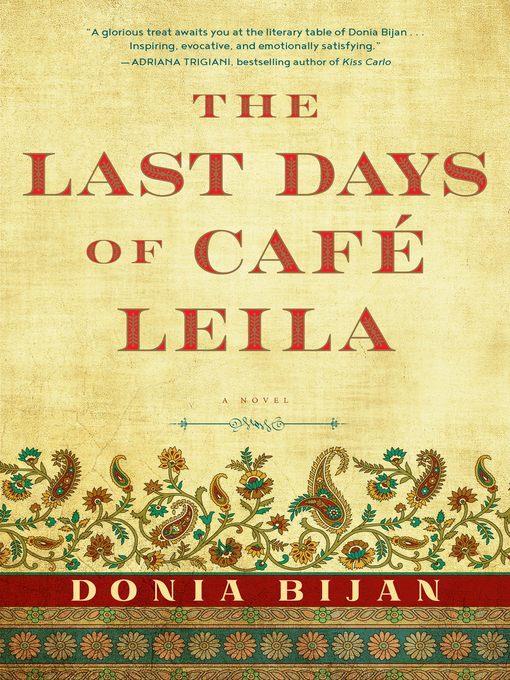
The Last Days of Café Leila
A Novel
کتاب های مرتبط
- اطلاعات
- نقد و بررسی
- دیدگاه کاربران
نقد و بررسی

May 1, 2017
DEBUT Serving a rich helping of Iran's complex food, culture, and political history, this stunning debut novel picks up after Noor leaves San Francisco for her homeland, seeking support and solace from her father, Zod, following a marital breakup. Her teenage daughter Lily reluctantly accompanies her to a postrevolutionary Tehran that Noor has not visited since Zod sent her and her brother away for their own safety. The Tehran encountered by mother and daughter is characterized by both gracious spaces--like that within the walls of the family restaurant, Cafe Leila--and horrific acts of brutality like acid throwing by scorned men. Though Noor's return to home is the central story, readers are transported through her family's troubling history, recalling the immigration of Noor's grandparents from Russia and her own parents' tragic experiences during Iran's 1979 revolution. Successful chef Bijan has crafted a powerful story of love and loyalty filled with delicious descriptions of Persian cuisine that create immediate cravings for potato tadig or pomegranate soup. VERDICT After finishing this highly recommended entree, readers should consider Bijan's memoir, Maman's Homesick Pie: A Persian Heart in an American Kitchen, for dessert.--Faye A. Chadwell, Oregon State Univ., Lib., Corvallis, OR
Copyright 2017 Library Journal, LLC Used with permission.

February 15, 2017
This lyrical debut novel, an immigrant saga and coming-of-age story, provides a tantalizing look at Iran pre- and post-revolution.It begins with a present-day reunion: Noor, sent to America to study when the Islamists took over in the 1970s, has returned to Tehran to visit her beloved father, Zod. She is accompanied by her teenage daughter, Lily--Noor and the girl's father are divorced--who wants no part of the homecoming. The ailing Zod runs a diminished version of Cafe Leila, once a celebrated restaurant with an adjoining hotel and lush garden, where Noor and her brother grew up: "[It] contained their history, everything important had happened here," the author writes. "It had been her entire world, an oasis where on hot summer afternoons they drank iced mint sherbets under a canopy of trees." The book then flashes back, filling in the story of how Zod's parents emigrated from Russia to Iran, his studies in Paris as a young man, and his blissfully happy marriage to Noor's mother, Pari. It also traces Noor's often lonely life as an emigre in northern California. In Tehran again, the focus shifts to Lily and her transition from a belligerent wild child to an almost grown-up who begins to embrace her Persian roots. There is drama aplenty in these pages--involving Pari's untimely death, in particular--but everything feels authentic; the writing is precise and self-assured. The author, an Iranian emigre who became a chef in America (publishing a recipe-laced memoir, Maman's Homesick Pie, 2011), sprinkles her novel with sensuous descriptions of food, underlining its connection to memory. And she tells her story from multiple perspectives, creating sympathetic characters with rich inner lives. If the ending isn't completely satisfying, it's at least pleasantly unexpected. Poignant and absorbing, the book explores the pull not only of family, but of the place we first call home.
COPYRIGHT(2017) Kirkus Reviews, ALL RIGHTS RESERVED.

February 15, 2017
Noor is lost in more ways than one. Having been set adrift in her adopted country of America after discovering her husband's infidelity, she returns home to Iran at her father's invitation, her teenage daughter reluctantly in tow. Noor hasn't been back to Tehran in the decades since her father sent her and her brother to California to escape the brutal post-revolution regime. Now she must put on a head scarf when entering Iranian airspace, and her daughter can only swim at a females-only pool. But among all the changes, her father's restaurant remains a community hub, its food and hospitality offering solace from the troubled world outside. As befits a restaurateur's household, in Noor's family their love is beautifully expressed through the meals they create together. For the most part, Iran's politics seem to exist on the periphery of their lives, which makes the sudden intrusions of the authorities all the more startling. Bijan has crafted a richly layered story of the deep connections within a family, resilient links that survive tragedy and distance.(Reprinted with permission of Booklist, copyright 2017, American Library Association.)

























دیدگاه کاربران